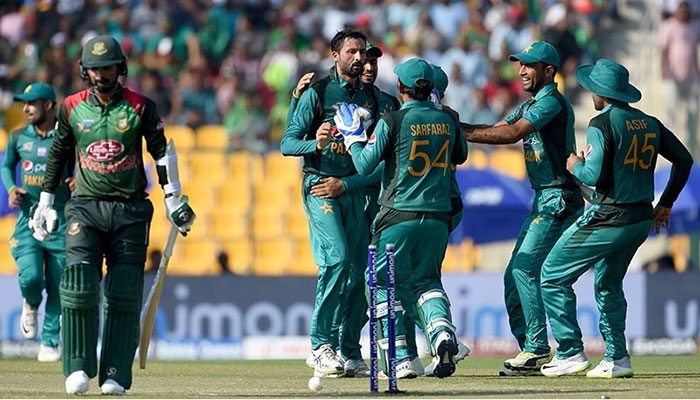Asia Cup: The burden of expectations on Pakistan
Pakistan crashed out of Asia Cup 2018 after losing their Super Four match against Bangladesh
September 29, 2018

When Pakistan won the Champions Trophy final last year, it became the talk of the town instantly, for all the right reasons. But the Pakistani players, the fans and the media got obsessed with that one particular win for far too long. Pakistan cricket started revolving around it, players were expected to emulate the same performances over and over again.
The team carried the same burden of expectations in the Asia Cup 2018. They kicked off their campaign against the spirited associate nation Hong Kong with a grand eight wicket victory. At that point everything made sense, the batting, the bowling and the team’s body language. They clicked as a unit, the hard hours put in training paid dividends.
The thing with Pakistan is, you never know which side will show up the next time they take field. The most anticipated encounter of the year, the battle royal, the mother of all encounters, the game against arch-rival, India, awaited them next.
This was also the first time the two teams met after the Champions Trophy final. Pakistan won the toss and chose not to show up at all as they were bundled out for a mere 162. The batting collapse was inevitable; Fakhar Zaman bagged his first ever ODI duck, apart from Shoaib Malik and Babar Azam’s 82 run stand for the third wicket no batsman took responsibility. In the battle of nerves, Pakistan were caught napping. Even their strike bowler Mohammad Amir failed to reproduce his mind boggling Champions Trophy final spell. In a parallel universe: Fakhar Zaman hit yet another century, Indian bowlers were taken to the cleaners by the middle-order, the bowlers blew India away and Pakistan registered their stamp of authority over an Indian side without the star-power of Virat Kohli.
Losing is a part of life, the manner in which you decide to counter the loss is what makes or breaks you. The loss against India exposed Pakistan’s weaknesses which were hiding under the ODI whitewashes against Sri Lanka and Zimbabwe. One can’t help but think how one loss against India broke the spell of hope, the hope to bounce back. They did manage to win their next game against Afghanistan which was also their first Super Four stage match. Afghanistan posted a fighting total of 258, their bowlers, in particular, Rashid Khan and Mujeeb Zadran gave Pakistani batters a run for their money. In the end, it was veteran Shoaib Malik who helped Pakistan cross the finish line in the very last over. The hope of bouncing back in the tournament were alive once again, only to be shattered.
Pakistan met India on September 23, this being their second Super Four clash. The result was no different from what happened earlier in the tournament. Yet, again a dejected Pakistan made it to the ground. They failed in all three departments; their will to fight back and their mojo went on a vacation. India humiliated them by nine wickets. Not only humiliated them, ensured the loss dented Pakistan to the core.
Pakistan's only chance now to reach the finals was to beat Bangladesh. A depleted Bangladesh team was never meant to be a threat on paper. If only matches were won on paper, they are meant to be fought on the battlefield. Junaid Khan’s return to the team helped restrict Bangladesh to a modest total of 239. This was not supposed to a walk in the park for the batters, it was also not supposed to be a fourth consecutive loss against Bangladesh either. Pakistan failed to chase down the target, fell short by a margin of 37 runs. The misery was evident. The batting collapses of the past came back to haunt the team.
And just like that Pakistan were out of the Asia Cup. Their disastrous campaign was marred by a series of continuous lack of character shown by individuals. The same individuals who were best in the business became villains in a span of 4 matches. The likes of Hassan Ali, Shadab Khan, Mohammed Amir, Fakhar Zaman, Babar Azam and most importantly Sarfraz Ahmed failed to deliver when it mattered the most. You can talk all about pressure and unstable team combinations and lack of supportive conditions and stability and so on and so forth but the fact of the matter remains, Pakistan failed to click as a unit. Their captain failed them not just with the bat but tactically as well. They lacked the grit to perform at the highest level when it mattered the most in conditions which have been home to them since 2009. Yes, Pakistan’s ODI track record is in tatters but is that an excuse enough to continue playing like they did? There are so many questions that need to be answered, so many voids that need to filled.
If only we could rewind back in time to June 18, 2017, when everything was perfect - the place, the performance, the title - and stay there forever. If only life was that simple, all of the mess this world has become would’ve never been a mess to begin with. There is still hope, this might be the perfect wake up call for Pakistan to fix the mess the team has always been in and move forward to create not a fairytale but a permanent happy ending.
Anam Nadeem is a sports writer based in Sialkot











